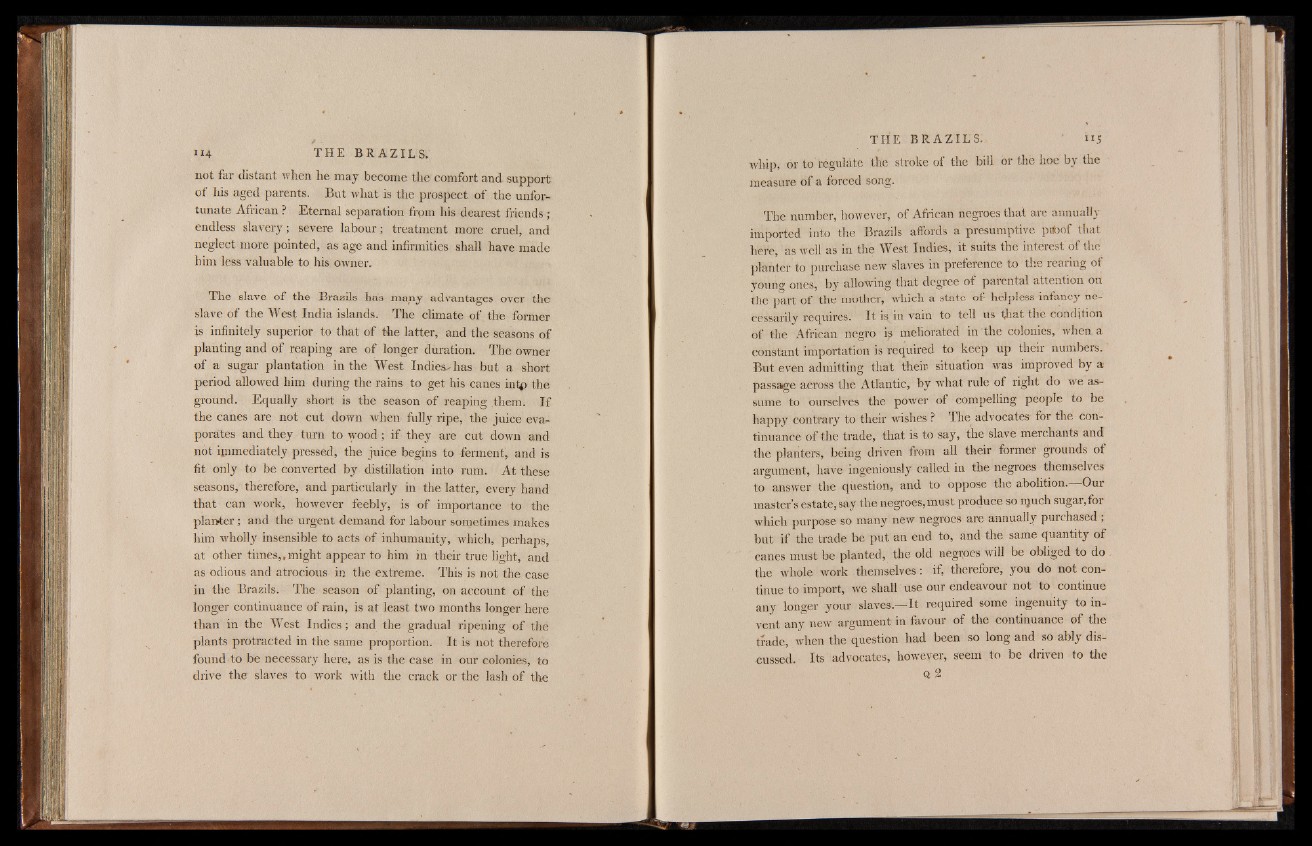
not far distant when he may become the comfort and support
of his aged parents. But what is the prospect of the unfortunate
African ? Eternal separation from his dearest friends ;
endless slaver}'; severe labour; treatment more cruel, and
neglect more pointed, as age and infirmities shall have made
him less valuable to his owner.
The slave of the Brazils has many advantages over the
slave of the West India islands. The climate of the former
is infinitely superior to that of the latter, and the seasons of
planting and of reaping are of longer duration. The owner
of a sugar plantation in the West Indies^ has but a short
period allowed him during the rains to get his canes intp the
ground. Equally short is the season of reaping them. If
the canes are not cut down when fully ripe, the juice evaporates
and they turn to wood; if they are cut down and
not immediately pressed, the juice begins to ferment, and is
fit only to be converted by distillation into rum. At these
seasons, therefore, and particularly in the latter, every hand
that can work, however feebly, is of importance to the
planter; and the urgent demand for labour sometimes makes
him wholly insensible to acts of inhumanity, which, perhaps,
at other times,, might appear to him in their true light, and
as odious and atrocious in the extreme. This is not the case
in the Brazils. The season of planting, on account of the
longer continuance of rain, is at least two months longer here
than in the West Indies; and the gradual ripening of the
plants protracted in the same proportion. It is not therefore
found to be necessary here, as is the case in our colonies, to
drive the slaves to work with the crack or the lash of the
T H E B R A Z I L S . ' 115
whip, or to regulate the stroke of the bill or the hoe by the
measure of a forced song.
The number, however, of African negroes that are annually
imported into the Brazils affords a presumptive pifeof that
here, as well as in the West Indies, it suits the interest of the
planter to purchase new slaves in preference to the rearing of
young ones, by allowing that degree of parental attention on
the part of the mother, which a state of helpless infancy necessarily
requires. I t 1a in vain to tell us that the condition
of the African negro i^ meliorated in the colonies, when a
constant importation is required to keep up their numbers.
But even admitting that their situation was improved by a-
passage across the Atlantic, by what rule of right do we assume
to ourselves the power of compelling people to be
happy contrary to their wishes P The advocates for the continuance
of the trade, that is to say, the slave merchants and
the planters, being driven from all their former grounds of
argument, have ingeniously called in the negroes themselves
to answer the question, and to oppose the abolition. Our
master’s estate, say the negroes, must produce so njuch sugar, for
which purpose so many new negroes are annually purchased,
but if the trade be put an end to, and the same quantity of
canes must be planted, the old negroes will be obliged to do
the whole work themselves: if, therefore, you do not continue
to import, we shall use our endeavour not to continue
any longer your slaves.—It required some ingenuity to invent
any new argument in favour of the continuance of the
trade, when the question had been so long and so ably discussed.
Its advocates, however, seem to be driven to the
q 2